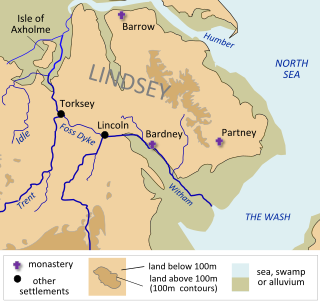Æthelberht was King of Kent from about 589 until his death. The eighth-century monk Bede, in his Ecclesiastical History of the English People, lists him as the third king to hold imperium over other Anglo-Saxon kingdoms. In the late ninth century Anglo-Saxon Chronicle, he is referred to as a bretwalda, or "Britain-ruler". He was the first English king to convert to Christianity.

Æthelred II, known as Æthelred the Unready, was King of the English from 978 to 1013 and again from 1014 until his death in 1016. His epithet comes from the Old English word unræd meaning "poorly advised"; it is a pun on his name, which means "well advised".

Offa was King of Mercia, a kingdom of Anglo-Saxon England, from 757 until his death. The son of Thingfrith and a descendant of Eowa, Offa came to the throne after a period of civil war following the assassination of Æthelbald. Offa defeated the other claimant, Beornred. In the early years of Offa's reign, it is likely that he consolidated his control of Midland peoples such as the Hwicce and the Magonsæte. Taking advantage of instability in the kingdom of Kent to establish himself as overlord, Offa also controlled Sussex by 771, though his authority did not remain unchallenged in either territory. In the 780s he extended Mercian Supremacy over most of southern England, allying with Beorhtric of Wessex, who married Offa's daughter Eadburh, and regained complete control of the southeast. He also became the overlord of East Anglia and had King Æthelberht II of East Anglia beheaded in 794, perhaps for rebelling against him.

Ecgberht, also spelled Egbert, Ecgbert, Ecgbriht, Ecgbeorht, and Ecbert, was King of Wessex from 802 until his death in 839. His father was King Ealhmund of Kent. In the 780s, Ecgberht was forced into exile to Charlemagne's court in the Frankish Empire by the kings Offa of Mercia and Beorhtric of Wessex, but on Beorhtric's death in 802, Ecgberht returned and took the throne.

The Kingdom of Lindsey or Linnuis was a lesser Anglo-Saxon kingdom, which was absorbed into Northumbria in the 7th century. The name Lindsey derives from the Old English toponym Lindesege, meaning "Isle of Lind". Lindum Colonia was the Roman name of the settlement which is now the City of Lincoln in Lincolnshire. Lindum was a Latinised form of a native Brittonic name which has been reconstructed as *Lindon.
Ælfgifu of Northampton was the first wife of Cnut the Great, King of England and Denmark, and mother of Harold Harefoot, King of England. She was regent of Norway from 1030 to 1035.
Lord Belhaven and Stenton, of the County of Haddington, is a Lordship of Parliament in the Peerage of Scotland. It was created in 1647 for Sir John Hamilton, 2nd Baronet, with remainder to his heirs male.

Sir Frank Merry StentonFBA was an English historian of Anglo-Saxon England, a professor of history at the University of Reading (1926–1946), president of the Royal Historical Society (1937–1945), Reading University's vice-chancellor (1946–1950).
The hide was an English unit of land measurement originally intended to represent the amount of land sufficient to support a household. It was traditionally taken to be 120 acres, but was in fact a measure of value and tax assessment, including obligations for food-rent, maintenance and repair of bridges and fortifications, manpower for the army, and (eventually) the geld land tax.
Æthelstan was the King of Kent from 839 to 851. He served under the authority and overlordship of his father, King Æthelwulf of Wessex, who appointed him. The late D, E and F versions of the Anglo-Saxon Chronicle describe Æthelstan as Æthelwulf's brother, but the A, B and C versions, and Æthelweard's Chronicon, state that he was Æthelwulf's son. Some historians have argued that it is more probable that he was a brother, including Eric John in 1966 and Ann Williams in 1978. However, in 1991 Ann Williams described him as Æthelwulf's son, and this is now generally accepted by historians, including Frank Stenton, Barbara Yorke, and D. P. Kirby.
Ealdred was an Earl in north-east England from the death of his uncle, Eadwulf Cudel, soon after 1018 until his murder in 1038. He is variously described by historians as Earl of Northumbria, Earl of Bernicia and Earl of Bamburgh, his stronghold on the Northumbrian coast. He was the son of Uhtred, Earl of Northumbria, who was murdered by Thurbrand the Hold in 1016 with the connivance of Cnut. Ealdred's mother was Ecgfrida, daughter of Aldhun, bishop of Durham.

Stenton is a parish and village in East Lothian, Scotland. It is bounded on the north by parts of the parishes of Prestonkirk and Dunbar, on the east by Spott and on the west by Whittingehame. The name is said to be of Saxon derivation. The village has a number of houses, a school, and a church.
A list of the abbots of the abbey of Peterborough, known until the late 10th century as "Medeshamstede".
Seaxwulf was the founding abbot of the Mercian monastery of Medeshamstede, and an early medieval bishop of Mercia. Very little is known of him beyond these details, drawn from sources such as Bede's Ecclesiastical History. Some further information was written down in the 12th century at Peterborough Abbey, as Medeshamstede was known by that time. This suggests that he began his career as a nobleman, and that he may have had royal connections outside Mercia.
Waldhere was an early medieval Bishop of London, England.
Gunhilde is said to have been the sister of Sweyn Forkbeard, King of Denmark, and the daughter of Harald Bluetooth. She was married to Pallig, a Dane who served the King of England, Æthelred the Unready, as ealdorman of Devonshire.

The North Sea Empire, also known as the Anglo-Scandinavian Empire, was the personal union of the kingdoms of England, Denmark and Norway for most of the period between 1013 and 1042 towards the end of the Viking Age. This ephemeral Norse-ruled empire was a thalassocracy, its components only connected by and dependent upon the sea.

The Mercian Supremacy was the period of Anglo-Saxon history between c. 716 and c. 825, when the kingdom of Mercia dominated the Anglo-Saxon Heptarchy in England. Sir Frank Stenton apparently coined the phrase, arguing that Offa of Mercia, who ruled 757–796, effectively achieved the unification of England south of the Humber estuary. Scholastic opinion on the relationship between the kingdoms of Wessex and Mercia at this time remains divided.
Doris Mary Stenton, Lady Stenton, (1894–1971) was an English historian of the Middle Ages.

Sir Allen Mawer, was an English philologist. A notable researcher of Viking activity in the British Isles, Mawer is best known as the founder of the English Place-Name Society, and as Provost of University College London from 1929 to 1942.









